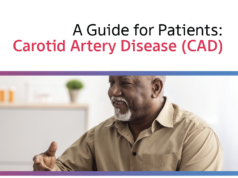VentureMed Group, a medical device innovator in access management for arteriovenous (AV) fistulas and grafts and vessel preparation for peripheral arterial disease (PAD), announced data presented at the 2022 VEITHsymposium (Nov. 15–19) in New York City that demonstrated that Flex vessel prep used prior to balloon angioplasty improves 12-month outcomes both in PAD and AV fistulas and grafts.
“AV Access management is a critical component of successfully treating AV patients over time,” said John Aruny, MD, from the Dialysis Access Institute in Orangeburg, South Carolina, primary investigator of the Flex Vessel Prep AV registry clinical study, the 12-month outcomes of which he presented at VEITH. “The FLEX AV Registry 12-month outcomes shows that utilizing Flex vessel prep provides more time between interventions and continues to excel in the very difficult cephalic arch lesions.”
The study was a single arm, prospective study conducted in eight centers in the U.S. with 114 real world patients. The Flex AV Registry 12-month outcomes demonstrate sustained patency across most patients and particularly good results specifically in the cephalic arch.
- 49% patency for all AV fistula patients (comparable historical data 26%)
- 59.7% patency for cephalic arch lesions (comparable historical data 0–33.9%)
- AV grafts had average time to target lesion revascularization of 228 days (41.2% patency at nine months)
- No observed serious adverse events.
“Vessel preparation has become a necessary step for better patient outcomes,” said Eric Secemsky, MD, director of vascular intervention, Beth Israel Deaconess Medical Center in Boston, who presented the 12-month results of the Belong study with Flex vessel prep system prior to drug-coated balloon (DCB). “Vessel preparation in PAD with Flex creating longitudinal microincisions prior to DCB therapy had impressive freedom from clinically driven target lesion revascularization and looks to improve outcomes by lowering balloon inflation pressures and potentially enhancing drug delivery.”
The Belong study was a single-center, single-arm, prospective study conducted with 41 patients in Fribourg, Switzerland.
12-month efficacy results:
- 97.5% (39/40) freedom from clinically driven target lesion revascularization
- 84.2% (32/38) freedom from target lesion restenosis via duplex
- 14/32 patients had stents
- 100% freedom from major amputation.











